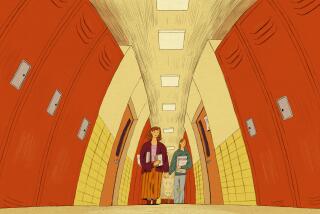Back to the Classroom in Search of the Renaissance Man
- Share via
My major regret about my low-cost education at a large Midwestern university is that it didn’t include a senior year. Instead, after three chemistry- and biology- crammed years, I entered medical school.
So when I hear a baroque opera I don’t recognize, a literary allusion I don’t know or a historical fact I don’t connect, I blame it on my missing senior year of college.
That year, I am sure, would have transformed me into a Renaissance man. Of course, overcoming my ignorance about the Hindu religion, the novels of Thackeray and the early string quartets of Beethoven would have required a 90-credit semester load. Nevertheless, that year would have educated me.
So a decade ago, at the age of 45, I decided to do something about this deficit. I went back to school.
My local community college, Santa Monica College, takes all comers--high school graduates who can’t qualify or afford the universities, teachers taking credits for extra pay, late bloomers and re-entry students and restless citizens like myself.
So a middle-aged male wearing a tie--if I forget to take it off before class--is not so unusual.
The hours are convenient, 7 to 10 on most nights, and there is a smorgasbord of courses to take from art history and auto mechanics to X-ray technology and zoology.
Registration is not always easy. The first course I signed up for was advanced English composition. The first line (a 30-minute wait) established that I was a U.S. citizen, a Santa Monica resident, and a non-degree student.
The next line (40-minute wait) ended with the revelation “Sorry, you haven’t taken freshman English, so you don’t have the prerequisites.”
But there was hope. “You have an MD degree from the University of Wisconsin? Go see our adviser.” The next line (50-minute wait), the advising dean’s line, got me permission to take the course.
The final line (60-minute wait) got me signed up but only on the waiting list--the course was overbooked. So three hours in line earned me the privilege of paying $7.50 for my student registration card. To celebrate, I bought a Santa Monica College T-shirt and had a soda in the Student Union.
I showed up promptly at 7 p.m. the next Monday with my student card in hand, wearing my new T-shirt and tennis shoes so I would blend in. There were no seats, so some of the 70 students were standing along the wall waiting to take the class.
I sat on the window sill while the instructor talked about writing in general, poetry in particular and how the class would be conducted.
At 8:30 p.m., we broke for coffee, and, still enthusiastic about my new career, I asked the teacher if I could sign up with the caveat that I wouldn’t want to be assigned to the window sill for the whole semester. He welcomed me to his class and said there would be lots of seats after that night’s first writing assignment.
This task, to describe the details of a five-minute encounter that happened in the last three months--to be read aloud next week--reduced the class to 25. Further attrition occurred throughout the semester. There were only 10 students by the end of the semester.
In the meantime, I wrote, listened, analyzed, discussed and realized that the birth of my great American novel would be after a difficult gestation. But Monday nights gave me a chance to lose my doctor identity. I was Richard in the class.
I could ask dumb questions, chat with the kid working at McDonald’s who liked poetry and silently weep with the young woman whose prose poured out the story of her sad marriage.
About halfway though the course, after I had attended two consecutive out-of-town meetings, my instructor inquired gently about my absences, because he wanted me to finish the course and get my credits.
He told me that he realized we all had daytime jobs that were exhausting but that completing the course was an investment in the future. He asked me what I did for a living, and I told him only that I worked at a local hospital.
I assured him I wouldn’t miss more classes and would finish the course--500 words per week for 15 weeks. I was happy to receive my B+.
For the next several years, I took other courses--art history, music appreciation, philosophy, economics, English literature, even women’s studies.
In other classes I learned something about the arguments of Descartes, the novels of Anne Tyler, the theory of supply and demand.
I also realized the truth of the adage that true knowledge is knowing what you do not know.
Equally important, night school gave me a new perspective on the role of the physician in society--since the waiting in line, the criticism of my feeble scholarly efforts, the worrying about exams and assignments and the devotion of the teachers--most of whom work as hard as doctors and are poorly paid part-timers--are not part of the doctor’s universe.
Best of all is the joy of learning about new subjects--without worrying too much about the grade or completing graduation requirements. Worst of all, I still haven’t completed my missing senior year.
More to Read
Sign up for Essential California
The most important California stories and recommendations in your inbox every morning.
You may occasionally receive promotional content from the Los Angeles Times.











